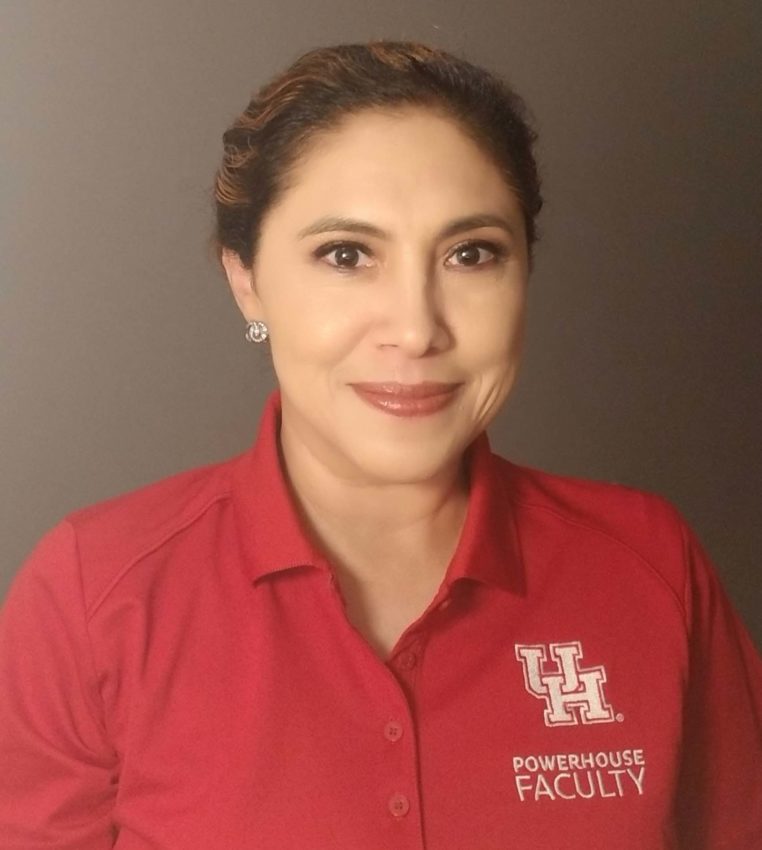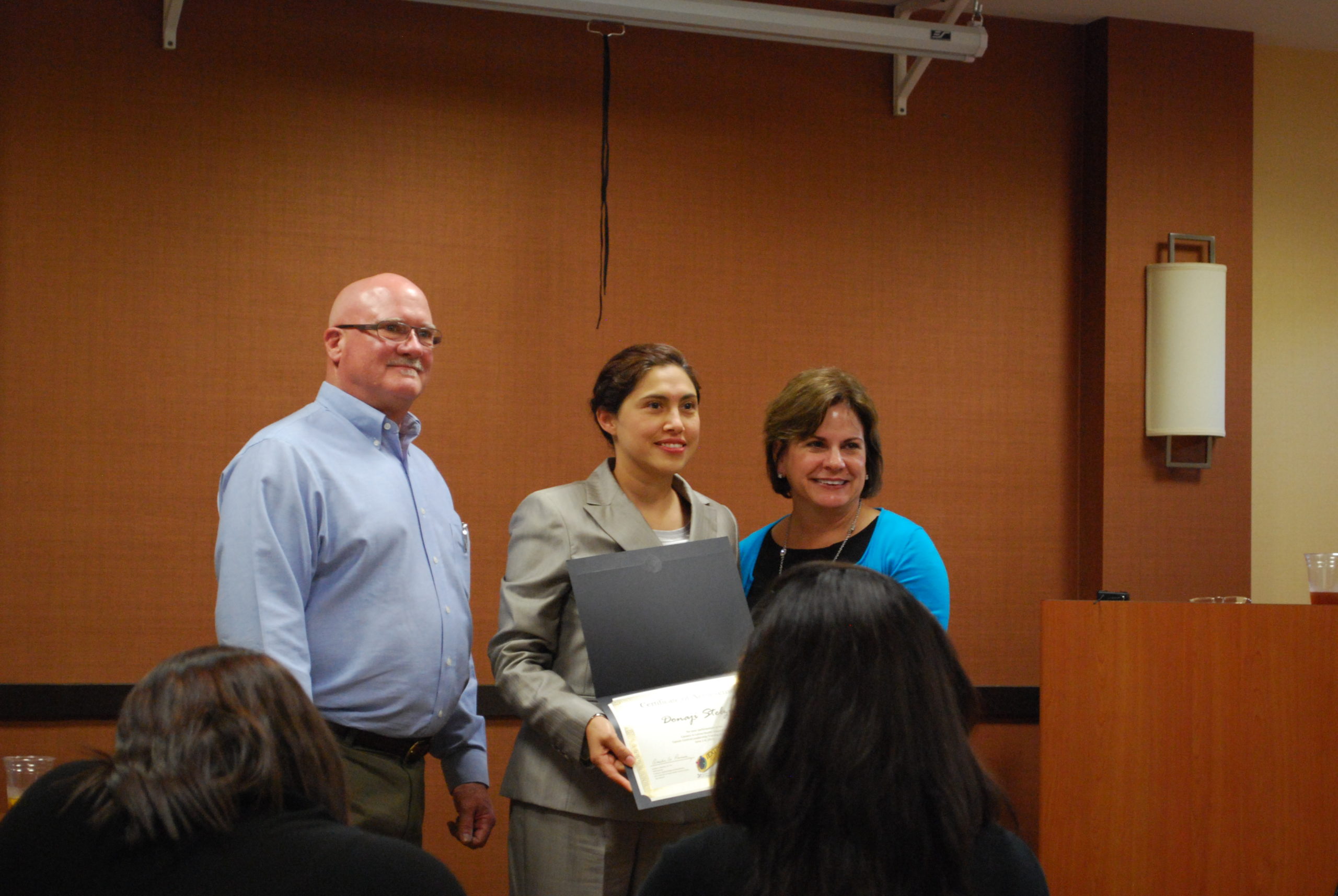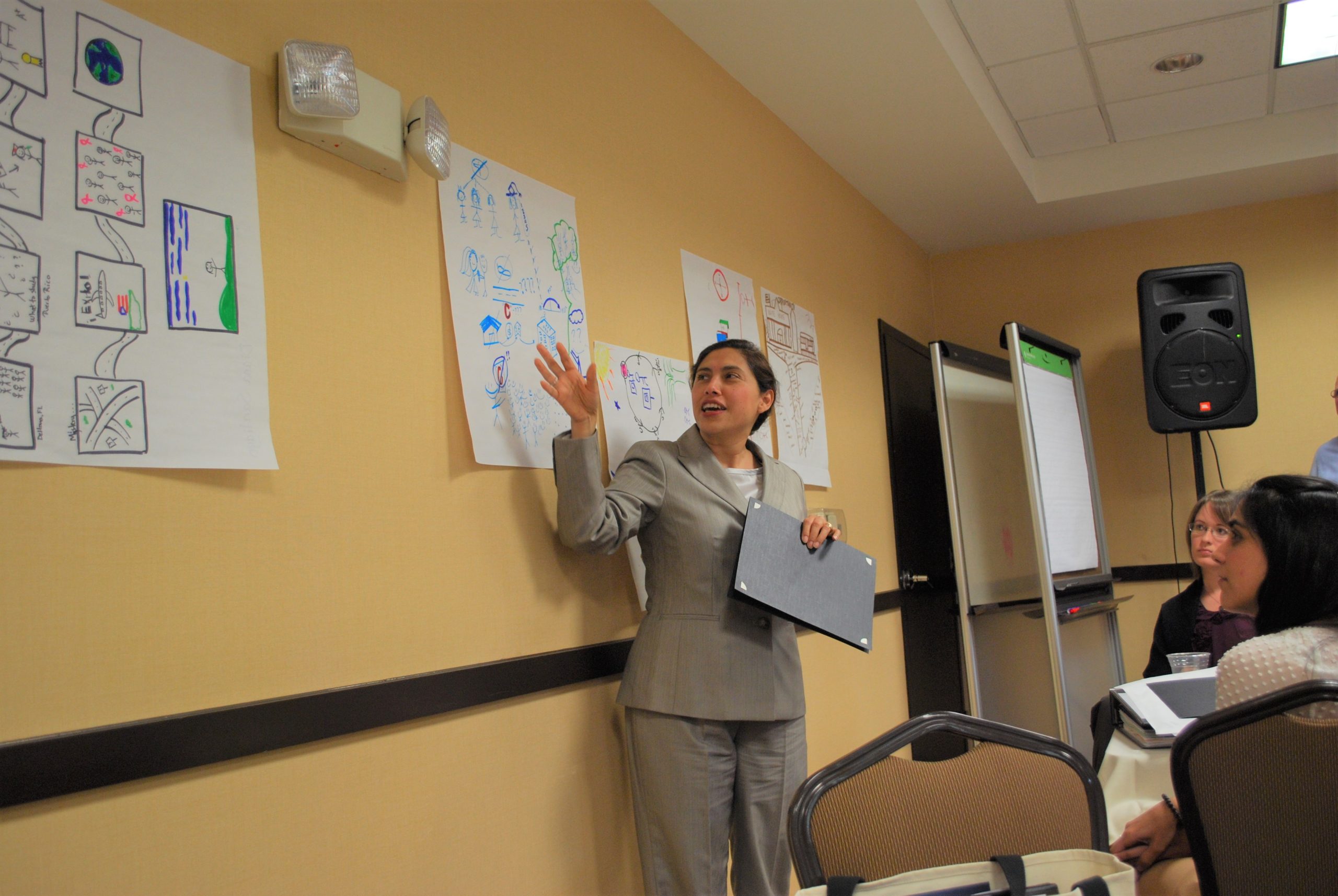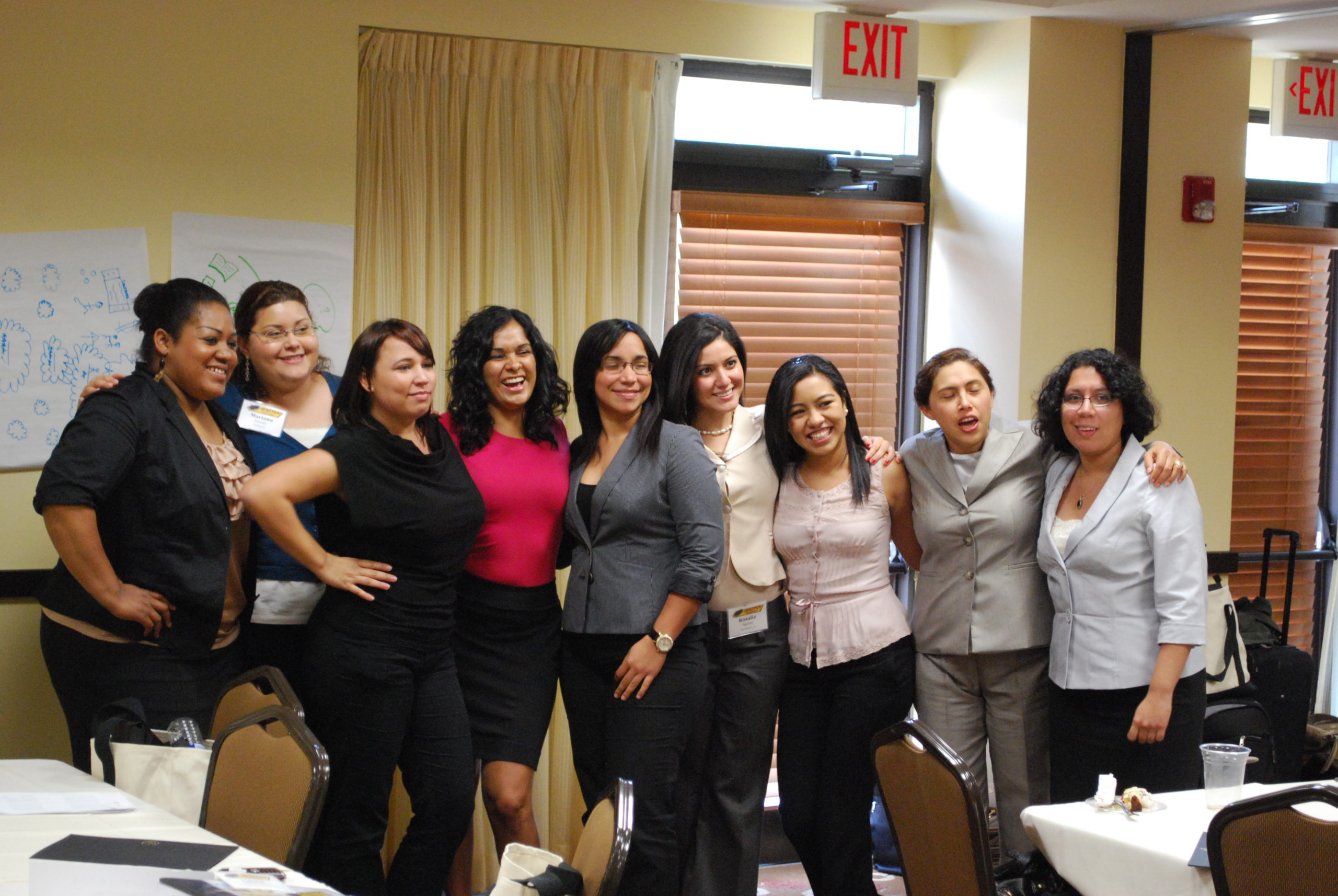
Share On Social!
Like many Latino students, Donají Stelzig was unsure if she should pursue a PhD.
She was intimated by the barriers and didn’t think she was capable of doing it, especially since she already had a full-time job and family.
But after attending the Éxito! Latino Cancer Research Leadership Training at UT Health San Antonio, the researchers and scholars she met encouraged her to apply and followed up with her even when she was doubtful.
Now, Stelzig has a doctoral degree and is a visiting assistant professor and lecturer at the University of Houston, where she also directs the Community Health Worker Training Center at the Honors College.
She’s grateful for the Éxito! experience and how it helped her build a network to succeed throughout her career.
Learning About Éxito!
Stelzig has known Dr. Amelie Ramirez, the director of Éxito! and the Institute for Health Promotion Research at UT Health San Antonio, for many years.
“Dr. Ramirez was a good friend of my sister. They went together to the same school of public health back in those days, and I met her there when she was a student,” Stelzig said.

When Ramirez began recruitment for the Éxito! program, she reached out Stelzig to help spread the word.
Éxito! recruits 25 master’s-level students and health professionals annually for a culturally tailored summer institute in San Antonio, Texas, optional internships, and ongoing education to promote pursuit of a doctoral degree and cancer research career.
“I think I sent her an email, I said, ‘How can I help you?’ And then she said, ‘Well, why don’t you join too?’” Stelzig said.
But Stelzig wasn’t interested in pursuing at PhD at that point in her career.
She had gotten her master’s of public health from the University of Texas Houston Health Science Center and was already established as a research coordinator there with no plans to go into academia.
But Ramirez convinced her to join Éxito! anyway.
What Stelzig Learned From Éxito!
Stelzig applied for Éxito! and was competitively selected to participate in the program’s first-ever summer institute in 2011.
For Stelzig, Éxito! was a great experience.
“It’s just a wonderful program to help people really achieve their goals. You have your network. You feel confident because everyone’s at the same level,” Stelzig said.
She was able to reconnect with other Latino researchers she had met earlier in her career and continue building a network of people she’s still close with years later.
“It was very good to see other faculty members that I knew as students, and now see all the work they’re doing. It gave me confidence. And it helped me to really start forming my network, and even though I don’t talk to much of them at all, I still feel like part of the family. I don’t feel alone. And I know if I send an email to somebody, I will immediately get a response,” Stelzig said.

Still, after attending the program, Stelzig knew the road to a PhD would not be easy.
“They said that Hispanic or Latino women are 0.05% of academia in the United States. I said, ‘Wow, it would be nice to be me one day, but I know I will never get there.’ I didn’t feel that I was smart enough and I was not going to do any academia, nothing like that. But being in that number now is quite shocking,” Stelzig said.
Éxito! aims to address the underrepresentation of Latinos in academia.
In fact, Latinos earn just 3.9% of all science and engineering doctoral degrees conferred, according to the National Science Foundation.
Éxito! helped Stelzig overcome some of the barriers that Latinos often face when getting into academia, like lack of connections.
“Éxito! put me in contact with great people that have helped me because there are a lot of barriers. Number one is that you don’t have a research team, and so with all the grants, if you’re not well known, there’s not a chance. The network that I started after the program helped a lot,” Stelzig said.
Applying to PhDs After Éxito!
It was a follow-up email from Éxito! that made Stelzig reconsider apply to PhD programs.
“I didn’t do much (immediately) after Éxito!, but then six months later, they sent me an email. And they said, ‘Well, have you applied? Have you done something?’ Well, I’m gonna try,” Stelzig said.
She was still hesitant that she’d be accepted into any PhD programs and wasn’t sure she had the time.
“I’m very old. I have a full-time job and family. No, that’s not for me. Because when I attended the program, I saw how much time and commitment it was and so I didn’t want to waste anybody’s time. But I went ahead and applied and right away they called me,” Stelzig said.

The director of admissions at the school of public health at Texas A&M University suggested that Stelzig take a summer class to see what she thought of the program.
“I said, ‘Well, why not? So I did. And then after that, that class in the summer ended and they admitted me and then here I am now,” Stelzig said.
Stelzig received her PhD in public heath from Texas A&M in 2019.
Now at the University of Houston, she leads the Community Health Worker Training Center in the Honors College, where she focuses on health equity for ethnic minority groups and maternal health.
Her Advice for Latino Students
Stelzig advises young Latino students to take advantage of the opportunities around them and build your network when you can.
“Use any opportunity that you have to research or internships, or just send an email and try to talk to people. Don’t be afraid, because you will never know. We need more smart and creative ways how to talk to our own people,” Stelzig said.
She also says that being Latino isn’t enough to connect with the community she’s trying to serve, because inclusive research needs to go beyond that.
“Just because my color or my accent, or my first language is that particular one of that specific group of my target population, doesn’t mean that I have all the answers. We have to really be more inclusive. And maybe those young Latino students, they have the answer, or they have the experience, they don’t even know,” Stelzig said.
Learn More About Éxito!
Of 226 Éxito! trainees since 2011, over 25% have enrolled in or, like Stelzig, graduated from a doctoral program.
Also, the Éxito! summer institute significantly increased trainees’ confidence to apply to a doctoral program and academic self-efficacy, according to a 2019 study of Éxito! program results published in the Journal of Cancer Education. The study also found significant increased research skills among Éxito! interns.
In 2018, Éxito! was named an innovative “Program to Watch” in a report by Excelencia in Education, a national group that promotes Latinos in higher education. The group also includes Éxito! as part of its “Growing What Works Database.”
Excelencia also selected Éxito! as a winner of its 2021 “Examples of Excelencia” award, having also been a finalist in 2018 and 2019.
Go to www.exitotraining.org for more information.
How Can I Advocate for Latinos in Healthcare?
You can make a difference by advocating for health equity in your own community.
Select your county name and get a customized Health Equity Report Card from Salud America! at UT Health San Antonio, which shows your area stacks up in housing, transit, poverty, health care, food, and other health equity issues compared to your state and nation.
The Health Equity Report Card auto-generates local data with interactive maps and comparative gauges, which can help you visualize and explore health inequities.
Latinos in healthcare like Stelzig may also face barriers and bias when working in the industry.
Did you know that doctors have implicit, subconscious preferences for white patients over those of color?
This is implicit bias.
These biases — stereotypes that affect our understanding and decisions about others beyond our conscious control — lead to discrimination and health disparities.
Fortunately, implicit bias can be “rewired” for compassion for patients of color.
Download the free Salud America! Action Pack “Health Care Workers and Researchers: Find If You Have Implicit Bias and What to Do Next.”
By The Numbers
84
percent
of Latino parents support public funding for afterschool programs
This success story was produced by Salud America! with support from the Robert Wood Johnson Foundation.
The stories are intended for educational and informative purposes. References to specific policymakers, individuals, schools, policies, or companies have been included solely to advance these purposes and do not constitute an endorsement, sponsorship, or recommendation. Stories are based on and told by real community members and are the opinions and views of the individuals whose stories are told. Organization and activities described were not supported by Salud America! or the Robert Wood Johnson Foundation and do not necessarily represent the views of Salud America! or the Robert Wood Johnson Foundation.



